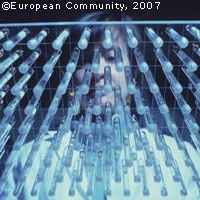Commission unveils plans for cooperation between national research programmes
The European Commission has set out its plans for boosting cooperation between national research funding programmes. The new 'Joint Programming' scheme is designed to ensure that public research funds are used as efficiently as possible, and help Europe tackle shared problems more effectively. The first Joint Programming Initiatives should be launched by 2010. Just 15% of public research funds in Europe are allocated at the European level, either through the EU's own framework programmes, or through intergovernmental organisations such as CERN (the European Organisation for Nuclear Research) or pan-European schemes like EUREKA. The remaining 85% is locked up in programmes which are designed and implemented nationally. Currently, there is little collaboration between these national research programmes, although many of the challenges they address are shared by all European countries. 'Challenges such as food safety, healthcare, marine ecosystems and biodiversity, climate change and energy are not confined to Member States borders, so research should be done jointly, and not simply nationally,' explained EU Science and Research Commissioner, Janez Potocnik. 'National programmes are obviously necessary; however, in certain areas of strategic public interest, they can result in duplication and may lead to a shortfall in the critical mass of resources needed to make a significant impact. As we have difficulties in increasing our research investment to the Lisbon target of 3% of our GDP, we should increase the impact of our national investments by acting jointly.' The new Joint Programming Initiatives will see Member States combine resources and monitor and review progress together. Membership of the initiatives will be entirely voluntary, and the emphasis will be on pooling public research funds (unlike the Joint Technology Initiatives, which combine public and private research funds). Member States wishing to work together on a given issue will first have to set out a common, long term vision for the agreed area. On the basis of this, a Strategic Research Agenda (SRA) will be drawn up, which should contain clear, measureable and realistic objectives. Finally, the SRA will be implemented; in this stage, all Member States involved will be expected to align their national research programmes to the SRA. The European Commission's role in all of this will be that of facilitator, although EU funds may be made available to certain initiatives depending on their added value and European dimension. According to the European Commission, Joint Programming will enable researchers to find common answers to common problems. 'Joint Programming has the potential to become a mechanism at least as important as the framework programmes in the European research landscape and to change the very way in which Europeans think about research,' commented Commissioner Potocnik. The plans will now be discussed by Europe's research ministers, who are expected to endorse the concept and objectives of Joint Programming by the end of the year. The ministers will then appoint a group of experts to identify the areas for which Joint Programming is most suitable. This selection will be made on the basis of clear criteria; for example, the challenge to be addressed must be pan-European or global in scale, yet be sufficiently focused so that clear objectives can be set. Publicly funded research must be key to addressing the problem, and the initiative should help to overcome fragmentation and duplication of research efforts in the field concerned. Eventually, the Council will officially launch the JPIs and monitor their progress. The Joint Programming scheme is just one of five launched by the Commission as part of its plans to reinvigorate the European Research Area (ERA). The others concern the management of intellectual property by public research organisations; research mobility and research careers; pan-European research infrastructures; and international science and technology cooperation.



